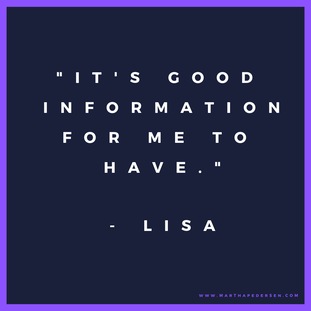 Many years ago I became friends with a wonderful woman named Lisa who rarely took anything personally. It wasn't that she never felt sad or had her feelings hurt, she just never took on other people's stuff as her own. She was a little older than I was, and wiser. I remember one conversation we had that changed the way I think about relationships. The details are fuzzy to me now, but the gist is that her boyfriend told her he was having doubts. Lisa was just sitting there with her cup of tea, calmly outlining the details. I remember saying something like, "Oh, whoa! What does he mean by that? Why does he think he can treat you like that?" And part of me was saying to myself, "How can she fix this? What is she going to do if he really leaves her?" Lisa, however, had an entirely different take on their conversation. She said, "It's good information for me to have." And pretty soon she broke up with him. I remember that so clearly because it was the first time I'd seen someone do that and it felt impossible to me. I would have tried to figure out what was happening in his head, tried to decide how to get him to talk to me about it, tried to analyze the situation and make it better. Lisa was accepting reality, checking in on how her values and needs fit with his, and deciding whether to move on. She was confident that if she moved on, she'd be able to find what she needed elsewhere. She understood that not every romantic relationship that starts well is actually a good fit. When I started therapy a few years later, the seeds of what Lisa said germinated and put down roots. I learned that I can go out and find what I want, I can hear bad (and good) news with an open heart and take appropriate steps. I can usually stay pretty grounded when things are blowing out of control around me. I'll always be grateful to Lisa for that conversation (and many others). She had another saying that I took to heart along the same lines: "If you're not happy, move your feet." I agree with Lisa - letting go, moving on is a great skill to have.
1 Comment
 Couples can get divorced anywhere on the spectrum of love and loathing. (Yes, couples can lovingly separate - it happens!) What has surprised me with clients and with my own journey through divorce is that the grief that comes with it doesn’t correlate with how you feel about your ex. Even assuming your feelings about your ex are in a steady state, which is never the case. So let’s put it this way - you just never know when grief will hit you. I have clients who have been separated for years and still find themselves crying every day when they finally end up signing the papers. I have clients who find themselves overwhelmed by grief for months and months afterwards, even when it was their idea and they know it’s the very best thing and what they want. And I have clients who are so excited to be out of a bad situation they don’t feel any grief until years later. I think there’s a lot of confusion about divorce grief and how long it’s supposed to take. Here’s the truth: there’s no answer. It takes as long as it takes. And though you can mitigate it, you can’t avoid it. How do you mitigate it? Here are some tips. First, stick to your routines. Don’t stop showering and eating and brushing your teeth and going to work and doing your dishes. If those things are hard for you, then see a therapist for help. You need your routines. Second, seek support. Talk to friends or family, find a support group, make connections. People generally want to feel connected and helpful, so let them. Third, feel the pain but don’t turn it into suffering. Cry and cry when you need to. Write scathing or heart wrenching letters to your ex and then burn them. Rant and rave. And when the impulse to express your feelings declines in intensity, go with it. It will decline. You won’t feel like crying for the rest of your life. You might not even feel like crying for more than a half hour. When you’re done, go blow your nose and do the dishes or watch something funny on TV or go for a walk. Just don’t try to hold on to feelings that are shifting or spin stories around them that aren’t necessarily true. That makes them linger. Let them shift. Fourth, if you’re a reader, read something uplifting. I’m not sure what those books are for you, but I’m sure they’re out there. It’s good to plant seeds of ideas that seem impossible right now, like the idea that you’ll feel better one day and the emotional roller coaster you’re on won’t last. Fifth, have some compassion for yourself. You wouldn’t tell a friend to suck it up and get over it. So don’t tell that to yourself either. Not kind, not necessary, and not true either. The list could go on, but those are the basics. The point here is that you need to do the obvious - take care of yourself and be patient with yourself. Those things are hard when we think we “should” be moving on, but they become easier when you give up that idea and practice the steps. I promise. Things get better the less you try to resist the pain. Sobbing over a financial statement or a box of your ex’s books or the colander you bought when you moved in together is totally fine and normal. Just let it happen and move on. You will move on, I promise, and the more you feel the pain and let it go, the faster it happens.  Relationships are all about compromise. When you're single, you make decisions based on your own comfort, convenience and values. When you're partnered, both people have to consider the other's point of view. It's part of respecting each other as individuals and it's a way to stay connected and learn about each other by entering into each other's worlds. This is crucial for a balanced partnership. But what if you're doing it while your partner is not? Side note: Before we dive into this, I just want to say that even the idea of imbalance can wreak havoc in relationships because it opens the door to resentment and judgement. We can start to develop what's called confirmation bias. What's confirmation bias? It's when we only see information that confirms a bias we already have. Like when you think your boyfriend is a jerk and so every little thing he does just proves it. And of course anything he does that's normal or nice gets filtered out through the "he's a jerk" mindset. That's confirmation bias in relationships. So before you jump to conclusions, it can be helpful to think hard about what's actually happening and see it from a few different perspectives just to be sure. Maybe your anger and resentment are rooted in something else and your relationship is just the easy target to pin it on. It's always worth considering. Okay, having said that, let's get back to the question: What if you're the only one compromising or you're compromising so much more than your partner that you're losing yourself in your relationship? And by losing yourself, I mean, saying yes to a whole bunch of things you wouldn't normally do and saying no to a whole bunch of things you normally would do and that you enjoy and care deeply about. I call this sacrificing yourself on the altar of your relationship. How do you know if this is happening? You may have sacrificed yourself on the altar of your relationship if you're:
These are just some of the things people experience when they give too much. What's funny, is I don't often hear these clients say they feel resentful - that doesn't come until later. And they're usually not thinking in a tit-for-tat or "score-keeping" way about who has done more of what. Mostly they feel sad or just confused about why things don't feel right. They know they're 'doing the right thing' by compromising for the sake of their relationship so they can't figure out why it isn't working. But there's such a thing as too much compromise. And if you're doing it, it's actually not helping your relationship. As Janet Lansbury said, "Boundaries are the highest form of love." She was talking about parenting (if you don't know her work and you're parenting babies or toddlers, you should look her up) but this applies to all relationships. Setting boundaries is a way of saying, "This is who I am. I'm not going to lie about who I am with you because relationships need to be based on honesty." We should all be able to establish our boundaries, the areas of ourselves and our lives that we will protect and keep nourished so that we can be happy and healthy as individuals and in relationship. And we should feel safe knowing that if something is important to us, it's important to our partner. If you're with someone who is willing to trash your boundaries, then that person is not for you. Your partner should respect and love your boundaries. Your partner should love that sometimes you need to have dinner with just your girlfriends, and that you need time to sew, and that your family matters to you, and that you don't like okra or too much time sitting in the sun and that sometimes you need to stay home and clean up and sometimes you need to honor your commitments at work. Your partner should also know whether you are someone who likes to talk things through or think things through, and how comfortable you are in different kinds of social situations. And you should know the same things about them. You don't make your lives revolve around these things for each other, you just know and respect them and accommodate as best as possible...without sacrificing yourself. You and your partner should know each other well - it's part of feeling loved, cared for and known. What about when two people's boundaries clash? Say, your need for time at home conflicts with your partner's need to socialize. Then you work out a compromise with full awareness that it's rooted in love on both sides. You both need to feel respected. And you both need to feel the trust that comes with knowing the other has your best interests at heart, as well as their own. If compromising doesn't feel like that, it's not the right kind of compromising. That's sacrificing yourself on the altar of your relationship and it's not going to work in the long run. In the long run, you're going to feel resentful and angry. If you think you're on this path, take a moment to consider what sort of boundaries you need to set up for yourself. And then consider what you'll do to enforce them. The reaction you get from your partner will be good information for you to have. Maybe they just didn't know what you needed because you haven't expressed it before and they're actually happy to help you. Or maybe you'll find you're not a good fit. Either way, you're on the path away from sacrifice toward nurturing and growth whether individually or as a couple. That's a better path. 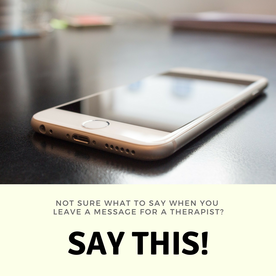 I had a friend ask me for a therapist recommendation the other day and the conversation took a turn I didn't expect. After I gave her a couple of names I followed it up by saying, "I'm not sure if they have openings, so you might want to call a few others in your network just in case." There was silence on the other end of the line and then she said, "And say what?" So then there was silence on my end of the line because I couldn't quite figure out what she meant. She followed up with, "I mean, what should I actually say when I'm calling some random therapist looking for an appointment? It seems like a lot of them just never call back. Is there something I should be saying? Plus, I always seem to get tongue tied!" Aha! Just to be clear - I would hope any therapist would call you back. Life does get in the way sometimes, but most of the therapists I know are pretty prompt and attentive. It also shouldn't matter what kind of message you leave. People should just call you back. Period. Common courtesy aside, however, this conversation got me thinking about two questions. What information is helpful for therapists? And what's a good script to relieve people's anxiety about calling therapists? Here's what I came up with. An ideal message would go something like this. "Hi, my name is Mary Jane and my phone number is (555) 555-5555. I'm looking for a therapist to help me deal with my anxiety about my recent divorce. I was wondering if you're taking new clients and if you take my insurance, which is Blue Cross Blue Shield. Also, I'd need an appointment time sometime in the evening or early morning. If you could call me back to let me know if I fit with your insurance and schedule that would be great. I can be reached at this number between 4-6 pm and it's okay to leave a message on this voicemail. Thank you." Why is this an ideal sort of message? Because it covers the following bases:
Even if you know the details you should include, it can still be nerve wracking to call and ask for something if you've never done it before. It's sort of like calling your insurance company the first time you get into a fender bender. If you haven't done it before, how would you know what information you need? So here's a script! Just fill in your own blanks and call away. If this helps you make a call you've been putting off making, I'm glad. "Hi, my name is _________ and my phone number is _________. I'm looking for a therapist to help me deal with ______________. I was wondering if you're taking new clients and if you take my insurance, which is ___________. Also, I'd need an appointment time sometime in the __________. If you could call me back to let me know if I fit with your insurance and schedule that would be great. I can be reached at this number between _____ and _____ and it's okay to leave a message on this voicemail. Thank you." Good luck. Therapy is worth the effort. And if you call me, I promise I'll call you back no matter what!  I've been listening to a very funny podcast lately called By the Book by two very funny women, Jolenta Greenberg and Kristen Meinzer. For each episode they read a self help book, live by it for two weeks, share their experiences and then declare whether or not they recommend it. They're very, very funny, in part because they are so different from each other and they often offer divergent opinions on the books they read. What works for Jolenta does NOT necessarily work for Kristin. This is pretty obvious to therapists because we see inside so many people's heads. "Normal" is definitely a moving target. For Kristin and Jolenta, there was only one book that they both recommended without reservation. Just one! Granted, they read books like The Secret and The Life Changing Magic of Tidying Up which are bound to push even like-minded people hard to one side of the recommendation fence or the other. But they both loved and recommended one book: What To Say When You Talk To Yourself by Shad Helmstetter. I was intrigued by this book for two reasons. 1) I remember hearing about it when it first came out in 1986 and thinking it sounded pretty funny ... before I was a therapist. 2) It's so obvious now that I'm a therapist that what we say when we talk to ourselves is actually really important. So, of course, I bought it and read it. There's something really great about this book. Helmstetter outlines very clearly the long term impact of both positive and negative self-talk. While reading it I was of so much other good research out there that's rooted in self talk, though it's not necessarily called out as such, like Kristin Neff's work on self compassion and Carol Dweck's work on mindset. What do we say to ourselves when we face a challenge or a loss? Or when we do well? And are we deliberate about it or do we just passively let our minds ramble on and on about how bad we are? Helmstetter makes a convincing argument that we have much more control over what we say in our heads than we think and that mindfulness and repetition are key. I have had many clients report feeling shocked at how unkind and critical they are of and to themselves once they start paying attention to what they say to themselves. It's kind of amazing how self-talk can slip right under the radar, unnoticed until it's annihilated its target, which happens to be your positive self-regard, integrity, motivation and general attitude toward life. There is an upside to negative self-talk, however. Listening to what we say to and about ourselves is a perfect first step towards mental health because it tells us where to look for the source of our problems. If you're always telling yourself you're a loser and no one will ever want to marry you, then relationships are where you need to heal. If you tell yourself you're incompetent, then maybe you have a history of being unsupported as a learner, scared out of making mistakes. Our self talk can teach us a lot about ourselves and what we need to work on. The best thing about this book is that it reminds us that we have a choice about what we say to ourselves. We can repeatedly talk back. It may not be a magic bullet (though according to Shad if you do it often enough and follow his guidelines, it is!) but it's something to keep in the forefront of the mental health tool box. It reminds me of that bumper sticker I used to see all the time: Don't Believe Everything You Think. Sometimes, it's worth sayin "NO" to your brain. And it's definitely worth listening to Kristen and Jolenta if you need a laugh. :) I started thinking about this topic after reading an excellent article by my friend and colleague Kate Murphy. In Self Care: Hard to Make the Time, So Worth the Effort, she discusses how important it is to take care of yourself, and the many ways we push ourselves when we shouldn't. As she and I discussed this, we both realized that this subject is pretty common conversation fodder for women and we are very mindful of how hard it is to avoid feeling overstretched. In fact, I was just talking with a friend this morning about her attempts to juggle the many demands she feels from her church, her kids, her home. It's hard to do it all because everything requires actual time, and time is finite.
However, I think we should also acknowledge that as hard it is for women to avoid the pressure to be superwoman, it's just as hard for men. When was the last time you heard a guy say, "I'm really low energy today. I think I need to take it easy." Or, "I really need to talk to my boss about my long hours." There are very few role models for men seeking work-life balance. Those commercials showing people taking a moment out of their hectic day to drink a cup of tea while looking out the window at birds flying over a sun drenched field of flowers - those tea-drinkers aren't men. I'm not going to go into the long list of ways that our culture puts (pits?) men and women into opposing camps because that's such a huge topic, I would have to write a book. But I can say for sure that they definitely don't share the self-care camp. A lot of men feel so much pressure to work, provide and succeed that self-care rarely enters their minds. At least women have cultural permission to step back and slow down, whether it's with a cup of tea, some smelly bubble bath or the cliched mani-pedi. Men have examples of very few outlets that are actually healthy (the gym, the pool table - with beer, sports events - with beer, TV - with beer). The friend I mentioned in the first paragraph said her high stress is partly because her husband is working 15 hour days. I suspect there are a lot more channels open for her to find solutions to her stress than there are for him. This is a large scale, systemic social imbalance. I don't have a solution for it. But I do have some words of advice. Men, take care of yourselves. Get some exercise, eat well, and take some time to pause and reflect on what's important to you. And women, if you have men in your life headed to burnout, in addition to modeling good self care, help make space for them to do this work, too. It helps everyone. 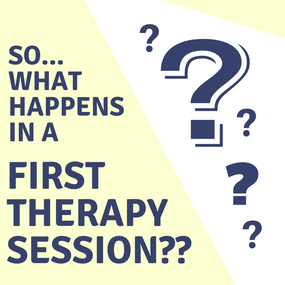 People put off starting therapy for a lot of different reasons, even when they know they really need help with something. Over the years I've heard a lot of different whys and wherefores for avoiding therapy and a lot of them boil down to this: "It'll feel weird/bad/scary/sad to say all this out loud because it's super personal/awkward/scary/upsetting/overwhelming. What's the point?" Of course, it feels much better once you're in it. And it feels great when you're done. But what happens between the before and after? You start. Starting is hard but nothing happens until you start. And it's easier to start when you know what to expect. I had a client recently tell me how helpful it had been to hear me describe during our consultation what his first session would be like. After that, he knew exactly what to expect. So for anyone else out there who needs to know what happens in a first therapy session, here you go. These are the things you can expect, as well as a few things you should consider, whether you're considering therapy with me or someone else. First, things first - hopefully-not-awkward introductions, shaking hands, smiling and settling in. (Insider tip: if there's a sofa, that's probably for you and the therapist usually takes the big chair. If you're not sure, look for the clipboard and then take the other seat!) Settle in and take this time to assess a few things. First, do you get a good vibe from this person? How does the fit feel? The very, very first sentence Dr. Romano uttered in my very first therapy class is highly applicable here: "The most important thing to remember as a therapist is this: Just be normal." We all laughed at the time, but it's true, right? Normal is completely underrated. And normal is completely relative to YOU. Does this person feel like a good match to your normal? Is this someone you can talk to? Do you feel comfortable with him or her? Next, usually comes a little chit chat and then I give people a general outline of what to expect over the next 50 minutes or so. These are the things in that list, though they often vary in order depending on how things go:
And that's it! A little chit chat, some questions from me, some questions from you, and you're done with your first session. It's not scary and it can feel really good to get it all out there. And pretty soon you'll be deep into the work, which is when the real fun begins. But first, you have to start. 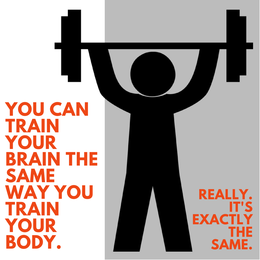 If you've ever tried to get in shape or learn a sport, you know that getting from incompetence to competence is really hard. It involves a lot of discomfort, both physical and mental. Doing new physical exercises can make muscles ache where you didn't even know you had muscles. (I'm very familiar with this feeling!) But in the back of your mind, you know that every workout and each ache and pain is a step toward your goal. The short term discomfort is worth the long term gain of health and strength. Therapy is like training. People come to therapy when they know they want to be stronger and healthier in some area of mental health and they don't know how to get there on their own. Like training, therapy also involves discomfort. If you've never done a pushup before, you're going to feel pretty weak and uncomfortable when you start. You might even be embarrassed that pushups are a problem for you. In the same way, if you've never developed coping skills for anxiety, or healthy relationships (and lots of people haven't), you're going to feel uncomfortable when you first try that, too. It's exactly the same. If you've ever done physical training, then you know how it goes. First, you identify a goal, then the skills needed to achieve that goal, and then you break those down into smaller, modified steps that you repeat over and over until you've mastered them, building up to where you want to be. Take pushups, for example. You'd start pushups against a wall, and then a counter top, and then the side of a bathtub, and then the floor with knees down and then, finally, hands and feet on the floor. (If you want to try it for real, don't take my advice! You're better off looking at Mark Lauren's books, You Are Your Own Gym, which are awesome.) For anxiety you could start with simply identifying the physical feelings, then identifying the triggers, then exploring the beliefs you have about the triggers and yourself, and then practicing coping skills like breathing or journaling or reframing, and of course, some exposure therapy and maybe some EMDR. Simple, right? Okay, so anxiety is a little more complicated than pushups. But my point is, the first time you try to really dig into one of those steps, you're going to be uncomfortable, and you'll probably wonder what the point is and you might feel like you're not getting anywhere and that progress is impossible and maybe pointless. But it's not. Just like you first learned to play football or rock climb or run track or play basketball, you can learn to tackle new mental skills, too. You just have to dig in, over and over. The brain is like a muscle. You can strengthen and teach it to new levels of skill and ability. As a trainer in my neighborhood has written on the windows of her gym: Try Trying. It pays off. 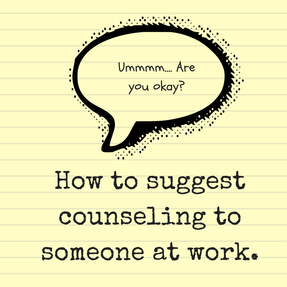 If you’ve ever seen a colleague suffering at work you know how difficult it can be to figure out how to help. Mental health issues and work don’t have to be an uncomfortable mix if you focus on genuine concern for the other person and do some legwork ahead of time. Here’s how to say something helpful in an appropriate way that won’t cross boundaries or set yourself up for being the in-office therapist. Strike the best tone What’s most important during any conversation about someone’s well-being? The intention to hold on to a sense of caring for the other person. This can be true no matter who the person is - close friend or acquaintance. Holding a genuine sense of caring will make it easier for them to hear what you say because the caring shines through. It doesn’t have to be an invitation to emotional intimacy or oversharing, just an attitude grounded in the belief that everyone is worthwhile. One way to make sure this is clear is to make time for the conversation. Don’t catch them in the break room or around the coffee pot. Take the time to let them know you’ve been paying attention and you’re concerned. Broach the subject objectively The simplest way to begin is with “I” statements about what you’ve noticed. For example, if you’re a friend you could say, “I’m worried about you. I’ve noticed that you’ve been late more than usual the last two weeks and you seem really down. I’ve also missed you coming out to lunch with us. I’m worried about you. Is everything okay?” This is much more effective than starting with, “What’s up with you? You seem off your game?” which can put someone on edge and be deflected with, “Nothing, I’m fine.” If the person you’re concerned about is your employee (or boss, though this can be scarier), an objective and specific approach is more appropriate. For example, “I’m checking in with you because I’ve noticed several absences and two missed deadlines in recent weeks. This is really unusual behavior for you. Is everything okay?” By objectifying the problem you’re not passing judgement and you’re starting with facts, which can’t be disputed. Stay present Whether they open up about their struggles or get defensive, stay present and calm and remember your goal: make it safe for them to consider getting help. If they are defensive, don’t push or get angry. Instead, let them know you were asking out of concern, you want the best for them, and that you’re not judging them. You can say these things out loud, or you can show them with a simple pause and a kind look. If you can do so honestly, let them know you’ve been through tough times and you know what that looks and feels like. Names and numbers If they acknowledge a problem, here’s your chance. Tell them that you want to help and that the best way you can think to do that is to help them find an expert who can help them see their situation from a whole new perspective. Do the legwork for them - offer the names and phone numbers of more than one therapist. Handing someone a handwritten list of names and numbers can make all the difference. Encourage investment or experimentation If you sense resistance, two approaches can help. Frame therapy as an investment in their future happiness and success, like buying stocks when the market is low, or frame it as an experiment, something they can try for a month and see how they like it, with no obligation. Either way, you’re making it less risky and more of an opportunity to learn. Follow up, but don’t pry Once you’ve offered someone names and numbers, wait and see what happens. You can’t make someone get help, but if things get noticeably better or worse you can check in with them again at some point. Alternatively, if they begin to open up to you more than you’d like, remind them that you’re not an expert and you’d really like to see them get help from someone who is. No matter what happens, expressing respectful and genuine caring to someone at work - or anywhere - is always worthwhile.  What is EMDR Therapy? First, "EMDR" stands for "Eye Movement Desensitization and Reprocessing." Translated, this means that EMDR therapy uses side to side eye movements (bilateral stimulation) to help your brain process old "stuck" memories so they become less triggering. A simpler description might be, "A Therapy that Clears the Clogged Up Places In Your Brain." What's so great about it? Research shows that EMDR is highly effective in healing trauma, including big "T" life-threatening Trauma like an assault or a car accident, and little "t" trauma like bullying, an emotionally abusive parent or social anxiety. Trauma of either kind can create what I think of as neurological knots - places in the brain where feelings are tangled up and stuck. In these places, thoughts, feelings and events (past, present or future) can trigger strong, inescapable thoughts and emotions that are hard to get around. EMDR is a powerful tool to loosen those tangles and get the regular network of thoughts and feelings back on track. I read somewhere once that mental health isn't about always feeling happy. It's about having all the feelings and moving on from each to the next in a timely manner and being able to keep them all in perspective. EMDR helps this happen. How does it work? But how does it work? Here are the logistics. A client is guided to think about whatever it is that is triggering for them while experiencing bilateral stimulation (BLS). The BLS "supercharges" their thoughts in those tangled up places so that that those knots are loosened up and thoughts can flow more normally through the brain without triggering strong, debilitating reactions. Just for clarification, bilateral stimulation means stimulating the left side of your body and then the right side, back and forth and back and forth. (This can be done by following something back and forth with your eyes like watching a tennis match, or by listening to beeps in alternating ears via headphones or feeling vibrations in alternating hands via little disks you hold in your hands.) A few examples Here are a couple of examples. For most people, seeing a white truck is no big deal and has no impact on day-to-day life. However, if you've experienced a car accident involving a white truck, seeing one might cause you to feel afraid, break out in a cold sweat, send your heart racing, and cause you to avoid driving. These reactions have a profound impact. You might plan your entire life around avoiding driving or be constantly anxious. EMDR sessions can loosen the tangle you have around the accident and put white trucks back in their proper context where they don't dominate your decision-making. An example of small "t" trauma might be the impact your parents' divorce has had on your ability to engage in healthy relationships. By identifying and reprocessing those memories, the knot of pain involved in thinking about relationships can be untangled and your decision-making about relationships can be clearer. Whatever the tangle is about, it can be loosened. Some people say EMDR helps reduce the "noise" or the "story" or "drama" about things that used to be very hard to deal with. Benefits One of the other benefits of EMDR is that the gains seem to be permanent. In one study, a group of clients with depression were broken into two groups. One was treated with Prozac, and another was treated with EMDR. After several months, both groups ended treatment. The group who had taken Prozac lost their gains without it, but the EMDR group maintained their progress. (The Prozac group was subsequently offered EMDR.) Another great benefit of EMDR is that is includes the body in therapy. During EMDR sessions, we focus not only on thoughts and emotions, but on feelings in the body as part of the healing process. The brain and the body need to work together to truly heal because we store so many experiences, good and bad, in our bodies. EMDR offers a safe and effective way to do that. You're the Expert Finally, EMDR is yet another example of how people are experts on themselves. In EMDR sessions, the mind untangles itself. The therapist doesn't do it - the client does. This is really true for all therapy - the client is the healer and the therapist facilitates and witnesses. EMDR sessions are a constant reminder to me that we are wiser than we know and that with the proper structure and support we can heal and be happier and more productive. It's a beautiful thing to see. |
 RSS Feed
RSS Feed